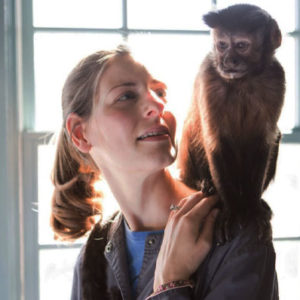The New York Times – Big Love for Little Helpers
As told to Perry Garfinkel
April 2, 2016
What does Helping Hands do, and what does your job involve?
Helping Hands is a nonprofit that trains and places capuchin monkeys to assist people with limited physical mobility. I oversee a staff of five professionals working with some 145 monkeys in the program, of whom 50 are currently in our Boston building. We train them here for up to five years before we match them with humans.
What is your educational background?
I majored in cognitive and learning psychology and minored in biology at Boston University. In my senior year, my animal behavior professor mentioned Helping Hands. I’ve been here for 15 years.
Why are capuchins suited for the job of literally being helping hands?
Unlike other service animals, capuchin monkeys have dexterous hands and advanced motor skills. They can easily be taught to turn pages, scratch itches, turn light switches on and off, help adjust people’s limbs and much more. At about five to eight pounds, they are light enough to sit on your lap but strong enough to handle most tasks. They are often thought to be one of the smartest species of monkeys. They have long lives, of 30 to 40 years; they are extremely social and become very loyal to people.
How do you match them with people?
Each capuchin has a different personality and individual preferences. We spend a lot of time making the right match of their personality with that of the human.
Do people then buy the capuchins?
We place the animals free of charge. Individual donations and foundation grants cover the approximately $40,000 it costs us to train and place each monkey. We currently have 35 capuchins living with partners in 13 states. We retain ownership of them so when their human partner can no longer care for them or, sadly, passes away, they return to us here.
How is it for the trainers after a capuchin is placed?
On the one hand we want our capuchin to be picked for placement, just like any parent who would be proud of her child’s accomplishment. It’s a sign that we trained them well. On the flip side, that morning when you say goodbye is horrible. But if you’re lucky enough to still be working here if they return, you’ve played such a significant role in their lives that they remember you forever.
Vocations asks people about their jobs. Interview conducted and condensed by Perry Garfinkel.
A version of this article appears in print on April 3, 2016, on page BU7 of the New York edition with the headline: Big Love for Little Helpers.


